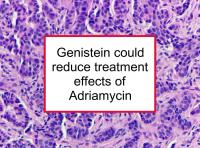Studies concerning genistein and breast cancer risk, treatment, and prognosis have produced inconsistent results. Genistein is one of two main isoflavones in soybeans; the other is daidzein. Both are phytoestrogens, plant molecules that are structurally and functionally similar to estrogen and can bind to estrogen receptors.
Phytoestrogens can reduce the potential breast cancer promoting effects of more powerful estrogens by competing for estrogen receptors, according to one theory. On the other hand, phytoestrogens appear to be capable of promoting estrogen-positive breast cancer under some circumstances. However, genistein also has biological activities that are independent of its role as a phytoestrogen. Now a new study has reported that genistein has the potential to interfere with doxorubicin chemotherapy in hormone receptor positive (ER+/PR+) disease.
The influence of genistein on breast cancer risk varies according to dosage and whether the genistein is consumed in food (soybeans, tofu), soy protein isolate, or as purified genistein supplements. It also varies according to the age at which the genistein is consumed, the genetic makeup of the consumer, and her level of endogenous estrogens. Hundreds of cell, animal, and epidemiological studies have been conducted to determine the association between genistein and breast cancer risk, producing a variety of sometimes contradictory results.
One of the most consistent findings is that Asian women with relatively high soybean intake in childhood appear to be somewhat protected against breast cancer in adulthood. However, a major Chinese prospective study recently reported that while high soy intake during adolescence and adulthood was associated with reduced premenopausal breast cancer risk, high adulthood soy intake was associated with reduced postmenopausal breast cancer risk only when adolescent intake was low.
However, despite the conflicting and confusing results of many soy-related studies, we cannot afford to ignore results suggesting that genistein can be harmful in some circumstances. The study described below is one such study.
Latest research finds genistein could induce multidrug resistance
The study referenced at the beginning of this news article was designed to investigate the effect of genistein on multidrug resistance in breast cancer cells. Cells that have developed multidrug resistance are a major cause of chemotherapy failure. The ATP-binding cassette (ABC) efflux transporters such as ABCC1 and ABCG2 play an important role in such failure. This family of proteins help determine the pharmacological behavior of drugs by affecting their oral bioavailability, direct intestinal effects, and urinary excretion of metabolites. In addition, the penetration of drugs into specific cell- and tissue compartments can be greatly inhibited by ABC transporters. Therefore, interactions with ABC transporters determine to a large extent the effectiveness of chemotherapy drugs, as well as their side effects. In the study, the authors examined the effect of genistein on the expression and function of ABC transporters in both ER+/PR+ MCF-7 and triple negative MDA-MB-231 breast cancer cells.
Genistein was found to cause induction of ABCC1 and ABCG2 in MCF-7 cells and of ABCC1 in MDA-MB-231 cells. There was a concomitant increase in doxorubicin and mitoxantrone (sometimes used to treat metastatic breast cancer) resistance in MCF-7 cells, which was a result of ABCG2 activity. The genistein-caused induction of ABCC1 in MDA-MB-231 cells did not modify chemoresistance since it was offset by simultaneous strong inhibition of transporter activity by genistein. ABC transporter protein increase was shown to be prevented by cycloheximide, an inhibitor of protein biosynthesis. These effects were not directly dependent on estrogen receptors. The authors conclude that the results suggest potential genistein-drug interactions that could threaten chemotherapy efficacy, especially in ABCG2-expressing tumors treated with substrates of this transporter.
Please see our article on what to eat during doxorubicin chemotherapy for more information.
